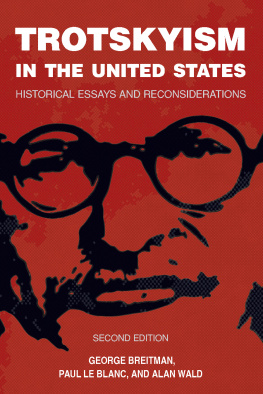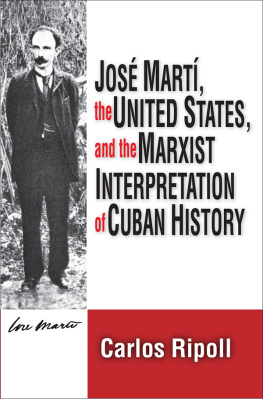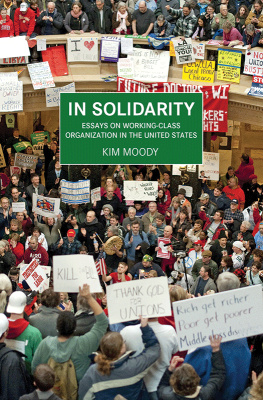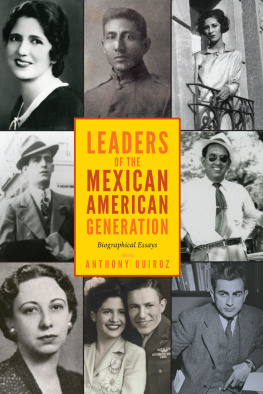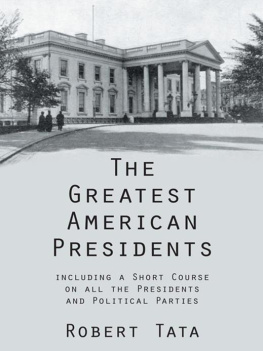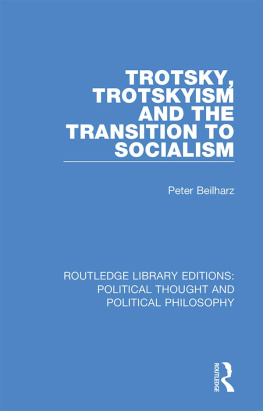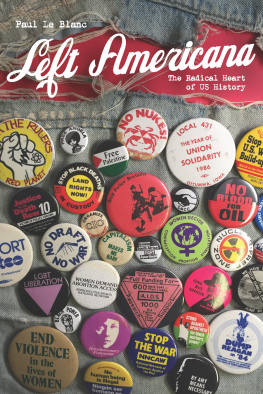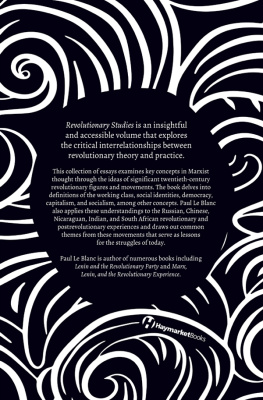Preface to the 2016 Edition
I t is good to see this set of essaysauthored by my mentor, the late George Breitman, my friend Alan Wald, and myselfbeing made more generally available for scholars and activists, especially those engaging with the vibrant traditions of revolutionary socialism. These essays seek, each in their own way, to advance an understanding of the history of an important current in that movement.
When I was young, I was taught to see the Trotskyites as a joke at best, and perhaps something more sinister (phonies, inveterate sectarians, manipulators, splitters, wreckers) at worst. Based on my own activism, my own study of diverse historical accounts and points of view, and a series of experiences over a number of years from the early 1960s through the early 1970s, I came to a different conclusion. I became a Trotskyist.
Some may wonder about the two different appellationsTrotsky ite and Trotsky ist . At times they are seen as synonyms, but sometimes there is really something deeper involved. To be a Trotskyist is to be in agreement, more or less, with the basic ideas and perspectives of Leon Trotsky. Trotskyite, however, originated as a term of denigration and abuse, and when applied to a person, it is meant to convey the notion of someone who is simply and rigidly in orbit around the very terrible ideas and personality of a pseudo-revolutionary fly-by-night figure named Leon Trotsky. I have never considered myself to be that but my Trotskyism has certainly evolved over the years, impacted by ongoing experience, study, and reflection. Each of the authors of this bookeach in his own wayexperienced a shifting (perhaps deepening) understanding of what happened in history, and that is reflected in these presentations and reflections on U.S. Trotskyism.
I
Leon Trotsky was one of the revolutionary socialist traditions central figures. Readers can find presentations of his perspectives in a number of works by and about him, including my own Leon Trotsky (Reaktion Books, 2015) and a collection of Trotskys writings that I coedited with Kunal Chattopadhyay, Leon Trotsky: Writings in Exile (Pluto Press, 2012). These perspectives provided the basis for the global network of revolutionary Marxists (often referred to as Trotskyists) that organized itself formally in 1938 as the Fourth International. The present volume focuses on the U.S. section of this world organization, starting off as the Communist League of America and ending as the Socialist Workers Party (SWP).
The U.S. Trotskyists traced their beginnings to the heroic years of the early Communist movement, inspired by the Russian Revolution in which Lenin, Trotsky, and the Russian Bolsheviks led a workers and peasants upsurge for the purpose of establishing rule by democratic councils (soviets) of the toilers all across the former tsarist empire, and sparking a global set of popular insurgencies that would overturn domination by capitalists and kings and establish a genuine commonwealth of the worlds working people. Betraying this vision was a layer of practical-minded leaders in the labor and socialist movementsocial democrats who opposed revolution and sought more limited improvements in compromise and partnership with the lords of capital and the powers that be. An even deeper, and ultimately more murderous, betrayal crystallized with a deradicalization of Russias postrevolutionary regime, and of the world Communist movement, under a bureaucratic dictatorship headed by Joseph Stalin. Those who gathered around Trotsky, in Russia and around the world, stood in opposition to such betrayals, with revolutionary socialist commitments intact.
The U.S. Trotskyists were also rooted in the native traditions of American radicalism, which I trace in my new collection Left Americana (2017) and whose story is told in a number of other worksmost famously Howard Zinns A Peoples History of the United States , with somewhat different takes in Sidney Lenss Radicalism in America (1966) and Michael Kazins American Dreamers (2013), and other accounts. It includes Tom Paine and other radicals of 1776; Frederick Douglass and others who later fought uncompromisingly against slavery; early feminists such as Frances Wright and Sojourner Truth and Elizabeth Cady Stanton; such labor radicals as Mary Mother Jones, Albert and Lucy Parsons, Eugene V. Debs, and Big Bill Haywood, all of whom saw the realization of a socialist democracy as an ultimate goal of workers fighting for a better life in the here and now.
After their ejection from the Communist mainstream in 1928, the pioneer Trotskyists of the United States worked hardin the context of the Great Depressionto double and triple and quadruple their numbers, spread their ideas, and set an impressive fighting example. By 1938 they had formed the SWP. Each of the authors of this volume was a member of that organizationone a founding member, one a recruit in the late 1960s, and one a recruit in the early 1970s.
In the 1980s, after U.S. Trotskyisms impressive half-century record of engagement in struggles of workers and the oppressed, the SWP suffered a shattering crisis. George Breitman composed the talks reproduced here before that crisis hit, at a time when the party to which he had committed his life seemed to him to be doing fairly wellalthough several years later it would expel him (and many others, including Alan and myself) from its ranks. Some formulations in the contributions I wrote for this book are marked by my hopes, at the time of writing, that the fragments of the SWP might somehow come together to rebuild a revitalized and strong section of the Fourth International in the United States. That was not to be. Alan Wald seems now to have been most accurate in perceiving the end of the U.S. Trotskyism of which the three of us had been part. Yet there is much in that tradition, both positive and negative lessons, for activists seeking to build a revolutionary movement dedicated to a better tomorrow. Some of that is presented here.
One of the many limitations of this volume is the restriction of focus to what might be termed the U.S. Trotskyist mainstreamwhich means a failure to give adequate examination of a rich variety of split-offs, offshoots, and so on that had a vibrant life of their own, and in some cases made important contributions to U.S. radicalism and social struggles.
Before 1938 these offshoots included clusters of people associated with Albert Weisbord, B. J. Field, Hugo Oehler and Tom Stamm, George Marlen (Spiro), and others. From 1940 onward, there were those associated with Max Shachtman, Albert Goldman and Felix Morrow, C. L. R. James and Raya Dunayevskaya, Bert Cochran, Sam Marcy, Clara and Richard Fraser, James Robertson, Tim Wohlforth, and others. The beginnings of such a comprehensive history are offered in Robert J. Alexanders useful 1,100-page compendium, International Trotskyism, 1929 1985: A Documented Analysis of the Movement (Duke University Press, 1991), with several hundred pages on various U.S. groups and grouplets. There are also many individual collections and accounts (in some cases, quite rich and substantial) related to one or another of the various dissident-Trotskyist and former-Trotskyist streams and tributaries.
The fact remains that this book of materials by George Breitman, Alan Wald, and myself is the first approximation of a single, readable account of U.S. Trotskyism from its early beginnings in the 1920s to its disintegration in the 1980s, with at least some attention to detail, nuance, complexity, and with an allowance for different interpretations whose interplay may help define issues and deepen understanding.
II
Someone once told me that the very conception of American Trotskyism is a nationalist conceit because Trotskyism is a quintessentially internationalist orientation. And, of course, the same could be said about Marxism as such. But in both cases, this strikes me as quite wrong. The life of these -isms has come from the people who embraced them, made use of them, lived them, contributed to them. These peopleeach of them, all of themare embedded in, reflect, and interact with specific cultural contexts and national experiences that indelibly mark their particular Marxism or Trotskyism. Sometimes distinctive contributions can result.

